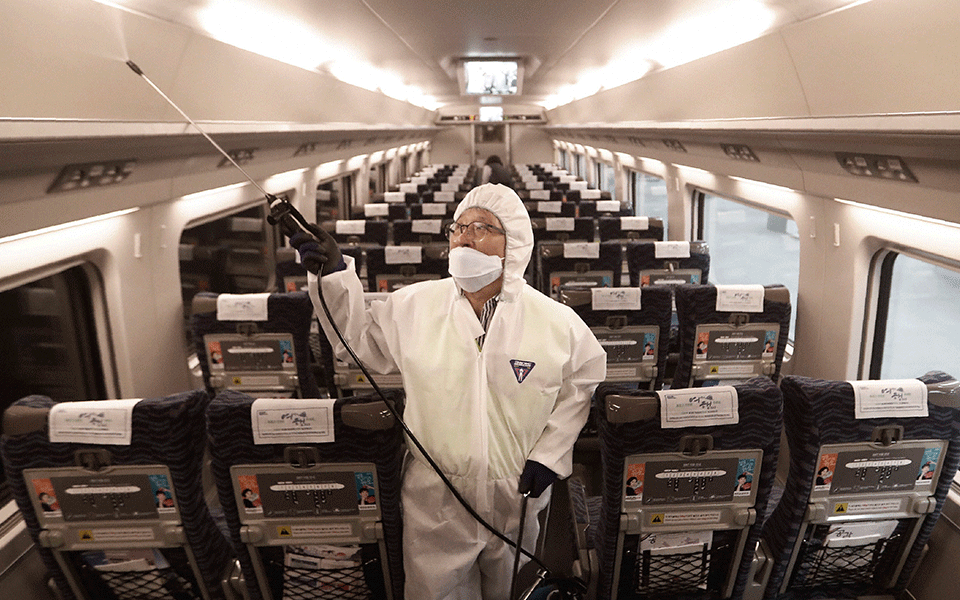Geneva: India, which led the world in eradicating two silent killers -- smallpox and polio -- in the past, has a tremendous capacity in eradicating the deadly coronavirus pandemic that has now claimed nearly 15,000 lives globally, according to a top WHO official.
The executive director of the World Health Organisation (WHO), Michael Ryan, said India, the world's second most populous country, has a tremendous capacity to deal with the coronavirus outbreak as it has the experience of eradicating the small-pox and polio through targeted public intervention.
"India led the world in eradicating two silent killers and eliminating them from the country," he said during a press conference in Geneva on Monday on the COVID-19 pandemic.
India, through targeted public intervention, ended smallpox and gave a great gift to the world. India also eradicated polio, he noted.
"India has tremendous capacities. It is exceptionally important that countries like India lead the way to show the world what can be done," Ryan said.
India led the world in eradicating two silent killers, small-pox and polio so India has a tremendous capacity," Ryan said.
"There are no easy answers. It is exceptionally important that countries like India show the way to the world as they have done before," he said.
His remarks came as the WHO said the number of deaths soared to 14,652, with more than 334,000 people infected worldwide.
India has reported 492 cases of coronavirus and nine deaths, according to Health Ministry data on Tuesday. The total number of active COVID-19 cases across the country now stands at 446, after over 22 fresh cases were reported, the ministry said.
Meanwhile, WHO Director-General Dr Tedros Adhanom Ghebreyesus on Monday warned that the coronavirus pandemic was clearly "accelerating" but said it was still possible to "change the trajectory" of the outbreak.
"The pandemic is accelerating," Tedros told journalists in a virtual news briefing.
He said it took 67 days from the beginning of the outbreak in China in late December for the virus to infect the first 100,000 people worldwide.
In comparison, it took 11 days for the second 100,000 cases and just four days for the third 100,000 cases, he said.
"The #COVID19 pandemic is accelerating. It took 67 days from the 1st reported case to reach the first 100K cases, 11 days for the second 100K cases & just 4 days for the third 100K cases.
"These numbers matter, these are people, whose lives & families have been turned upside down," Tedros tweeted later.
"We are not helpless bystanders. We can change the trajectory of this pandemic," Tedros said.
Let the Truth be known. If you read VB and like VB, please be a VB Supporter and Help us deliver the Truth to one and all.
Hyderabad (PTI): Telangana Chief Minister A Revanth Reddy met Union Home Minister Amit Shah in Delhi on Wednesday night and urged him to increase the sanctioned strength of IPS officers to the state in view of its growing administrative and security needs.
The two leaders also discussed the recent surrender of several senior Maoist leaders before the Telangana Police and other issues.
"During the meeting, the two leaders discussed the issue of Maoist surrenders and their rehabilitation. The chief minister informed Shah that significant improvements in policing have taken place in Telangana over the past two years," an official release here said.
Highlighting that 591 Maoists have laid down their arms and joined the mainstream of society during this period, the chief minister said the state government was providing them compensation and rehabilitation assistance as per the rules.
He requested the Union home minister to extend financial support from the central government for development works in the backward regions of the state.
Reddy also urged Shah to increase the sanctioned strength of IPS officers to the state from 83 to 105 in line with the state's growing administrative and security needs, the statement said.
The first cadre review after the formation of Telangana was conducted in 2016, while the next review, due in 2021, was delayed and finally carried out in 2025. Even then, only seven additional IPS officers were allocated to the state, the chief minister informed Shah and requested that the third cadre review be conducted in 2026 as per the schedule.
Reddy explained that Telangana, like the rest of the country, is facing several modern challenges, including cybercrime, drug trafficking, white-collar crimes, and other emerging security threats.
He highlighted the reorganisation of the Hyderabad, Cyberabad, and Malkajgiri Police Commissionerates, the proposed formation of the Future City Commissionerate and the rapidly growing population in Hyderabad to underline the increasing administrative requirements of the state.





